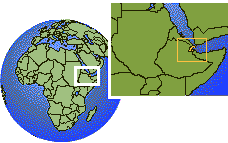
Djibouti


Formal Name
Djibouti,
republic in northeastern Africa, formerly French Territory of the Afars and the Issas. Also called Jibuti, it is bounded on the east by the Gulf of Aden; on the southeast by Somalia; on the south and west by Ethiopia; and on the north by Eritrea. It is strategically located at the Bab el Mandeb, the strait that links the Red Sea with the Gulf of Aden. It has an area of about 23,200 sq km (about 8958 sq mi).Land and Resources
Djibouti consists principally of arid plateaus. Inland, the terrain is broken by a series of saltwater basins. To the north of the Gulf of Tadjoura, which deeply indents the country's coast, lie several mountain ranges with heights of about 1525 to 1830 m (about 5000 to 6000 ft). Djibouti has a hot desert climate. The temperature at Djibouti (city) averages 26° C (78° F) in January and 36° C (96° F) in July. Annual rainfall ranges from 130 mm (5 in) at Djibouti to about 380 mm (about 15 in) in the mountains. Limited deposits of copper, gypsum, and iron ore exist but are not exploited.
Population and Government
The two principal ethnic groups are the Afar (Denakil), of Ethiopian origin, and the Issa, closely related to the people of Somalia. Both groups speak Cushitic languages and are Muslims. Minorities include Europeans and Arabs. The country has a total population (1995 estimate) of about 511,000, yielding an estimated population density of 22 persons per sq km (57 per sq mi). The capital, principal port, and only sizable city is Djibouti (population, 1991, 317,000). The population of Djibouti has swelled in recent years because of an influx of refugees from neighboring Somalia and Ethiopia.
Legislative power is vested in the Chamber of Deputies, the 65 members of which are popularly elected. A new constitution adopted in 1992 permits the existence of up to four political parties; three have since qualified. The republic's chief executive is a president chosen by the chamber. A cabinet, headed by a prime minister, is the principal administrative body.
Economy
Although less than one-tenth of the land area of Djibouti is suitable for grazing livestock, more than half of the inhabitants are pastoralists. Goats and sheep and a smaller number of cattle are raised. Agriculture is limited to a few oasis areas; crops include dates, fruits, and vegetables. The national economy depends upon the port of Djibouti, which is linked by railroad to
Adìs Abeba, Ethiopia, and serves as a principal seaport of Ethiopia. Exports include coffee (from Ethiopia), hides, and cattle. Djibouti (city) also serves as a regional air transport base. The currency is the Djibouti franc (177.7 francs equal U.S.$1; fixed rate since 1973).History
With an interest in balancing the English presence in Aden near the southern entrance to the Red Sea, the French secured a foothold in what is now Djibouti in the late 1850s. In 1888 the region was made the colony of French Somaliland. In 1946 it was made an overseas territory of France. Following agitation by Somali nationalists, a referendum, held in 1967, reaffirmed the desire of the majority of the population to remain part of the French Community; in the same year the area was renamed the French Territory of the Afars and Issas. Independence movements continued, however, and the territory became independent as Djibouti on June 27, 1977. Hassan Gouled Aptidon, chosen as the republic's first president, has governed since that time. He was elected to his fourth term as president in May 1993.